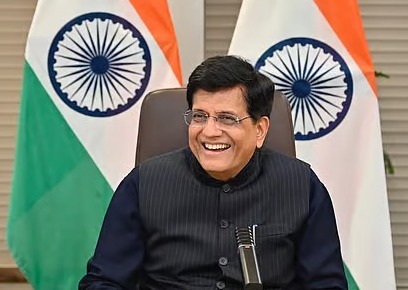
India and the United Arab Emirates (UAE) have set a bold new goal by reaching $100 billion in non-oil and non-precious metals trade by 2030. It highlights the growing partnership between the two nations and their commitment to building stronger economic ties beyond traditional oil trade.
The announcement came after a bilateral meeting between Indian Commerce Minister Piyush Goyal and UAE Foreign Trade Minister Thani bin Ahmed Al Zeyoudi. Both leaders agreed that deepening cooperation in emerging sectors like renewable energy, healthcare, supply chain resilience, and digital infrastructure will be the driving force behind this target.
A Growing Trade Relationship
India and the UAE already share a strong economic relationship. The UAE is one of India’s most important trading partners, playing a key role in boosting investment and trade volumes. According to recent figures, the non-oil trade between the two countries rose to $37.6 billion in the first half of 2025, showing that progress is well underway.
The foundation for this growth was laid through the Comprehensive Economic Partnership Agreement (CEPA), signed in February 2022 and implemented from May 2022. The agreement has already given a boost to bilateral trade, making it easier for businesses in both countries to access each other’s markets.
Minister Goyal described the partnership as resilient and future-ready. He pointed out that the Indian economy’s inherent strengths have helped it overcome global challenges and that working with diverse partners like the UAE brings mutual benefits.
Expanding Beyond Oil
While oil has traditionally been the backbone of trade between India and the UAE, the new focus is on non-oil sectors. This includes infrastructure, energy, renewable technology, digital solutions, and healthcare. Both sides also emphasized the importance of sharing trade data under CEPA for better monitoring and transparency.
The ministers discussed ways to enhance cooperation in pharmaceuticals, a sector that has become increasingly important in the wake of global health crises. The UAE has agreed to facilitate greater trade in Indian pharmaceutical and healthcare products. The establishment of Bharat Mart in the UAE will further ease access for Indian companies in the Middle East.
Initiatives for Smooth Trade
To ensure that trade expands smoothly, the two sides highlighted new initiatives such as the Local Currency Settlement System (INR-AED). This system will allow transactions in Indian rupees and UAE dirhams instead of relying on third-party currencies. It is expected to reduce costs, simplify transactions, and strengthen financial ties.
The ministers also underlined the importance of resolving trade-related issues quickly. They agreed to address challenges faced by Indian companies operating in the UAE and to continue dialogue on market access and regulatory matters.
Shared Vision for the Future
Both India and the UAE view this partnership as more than just trade numbers. It is about building a long-term relationship that supports growth, innovation, and economic stability for both nations. By focusing on sectors like clean energy, healthcare, and technology, the two countries are preparing to meet the demands of the future economy.
The UAE minister said that discussions were aimed at elevating bilateral cooperation to new heights. He reaffirmed the commitment to deepen ties with India, calling the partnership vital for global trade and investment.
A Strategic Milestone
The target of $100 billion in non-oil trade by 2030 is ambitious, but both countries believe it is achievable with consistent effort and collaboration. The progress under CEPA so far has created a strong foundation, and the shared commitment from both governments’ signals confidence in this journey.
As the two nations continue to work hand in hand, their shared goal stands as a symbol of resilience, trust, and a vision for a prosperous future beyond oil.





















